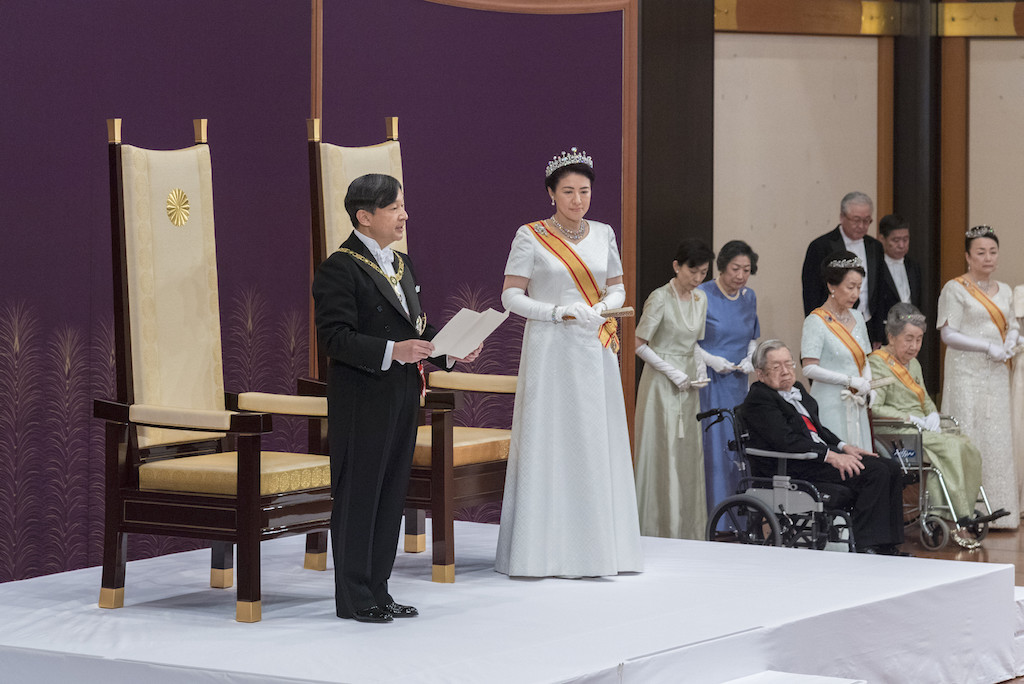Popular Reads
Top Results
Can't find what you're looking for?
View all search resultsPopular Reads
Top Results
Can't find what you're looking for?
View all search resultsWith new era, let’s continue efforts for peace, stability
It is important for Japan to maintain the intellectual level of its people and promote the formation of reasonable public opinion, in an age when a massive amount of information can be instantly spread on the internet.
Change text size
Gift Premium Articles
to Anyone
 This handout photo taken and released by Japan's Imperial Household Agency on May 1, 2019 shows Japan's Emperor Naruhito (L), watched by Empress Masako (C), giving a speech during a ceremony to receive the first audience after the accession to the throne at the Matsu-no-Ma state room inside the Imperial Palace in Tokyo. Japan's new Emperor Naruhito formally ascended the Chrysanthemum Throne on May 1, a day after his father abdicated from the world's oldest monarchy and ushered in a new imperial era. (AFP/File/Imperial Household Agency)
This handout photo taken and released by Japan's Imperial Household Agency on May 1, 2019 shows Japan's Emperor Naruhito (L), watched by Empress Masako (C), giving a speech during a ceremony to receive the first audience after the accession to the throne at the Matsu-no-Ma state room inside the Imperial Palace in Tokyo. Japan's new Emperor Naruhito formally ascended the Chrysanthemum Throne on May 1, a day after his father abdicated from the world's oldest monarchy and ushered in a new imperial era. (AFP/File/Imperial Household Agency)
The Emperor has abdicated and the curtain has fallen on the Heisei era.
We can stand proud that our peaceful, calm society continues as we welcome the first day of the first year of the Reiwa era.
Reflecting on the Heisei era, which followed the turbulent Showa era, the hope is to head into the coming generation carefully distinguishing between what should be passed down and what should be reformed.
In the past more than 30 years, Japan faced hardships such as a prolonged economic downturn, intensified international competition and a series of large-scale natural disasters.
Above all, the economy faced strong headwinds, the bubble economy burst and Japanese companies, which had dominated the world, lost their momentum. At one point, the yen’s sudden appreciation led to the hollowing out of industry. The inferiority of technological innovative power cannot be denied.
Gross domestic product (GDP) was surpassed by China’s, while per capita GDP dropped in the global ranking. National finances deteriorated extremely. These elements demonstrate stagnation, a present situation that we cannot be content with.
However, an economy inflated beyond its real strength and past experiences that were successful were unsustainable. Sooner or later, the Japanese economy would have come to a turning point.
Hard to maintain
Politics and the public sector as well as the people all tried to overcome the hard times through reforms.
With the electoral reform of the House of Representatives and realignment of government ministries and agencies, the political and administrative frameworks have changed. The financial, logistics and electrical machinery sectors were among the industries that suffered hardships and were realigned. Reforms are still in progress.
While the postwar restoration was effectively “creating” from devastation, Japan in the Heisei era faced difficulties “maintaining” its position as an economic power.
What should be especially noted is that there were efforts to not let the situation get out of hand even in severe cases. There were many companies that continued employing workers so that, even in the worst period, the total unemployment rate stood in the 5 percent range.
During the era, there were 18 cabinets, but the politicians basically respected the middle path, and excessive market fundamentalism and populism did not prevail.
Many people apparently supported choices that placed priority on stability.
In a Cabinet Office opinion survey last year, a record high 74 percent responded that they were “satisfied” with their current life. Nearly 60 percent responded that their living standards were “middle of the middle.”
The nation’s Gini coefficient — an index for income disparities — points to no more than a mild increase if tax payments and public pension benefits are reflected. The financial assets held by Japanese households exceed ¥1,800 trillion, double the level 30 years ago.
Japan is supported by a middle stratum of society, or people who enjoy a reasonable measure of affluence.
Some affluence vital
The Heisei era was the only period from the Meiji era onward in which this country experienced no war.
Furthermore, the nation worked to enhance its security framework, not withdrawing into a myopic mindset related to security, or what can be called “one-state pacifism.”
The Japan-US alliance, initially based on the situation of US-Soviet confrontation, was reworked after the end of the Cold War, so it could rapidly deal with the new international situation. The capability of the Self-Defense Forces was improved, but without incurring a sharp increase in defense expenditures.
There was no other realistic choice for Japan, a nation surrounded by military threats: China is emerging as a giant; North Korea possesses nuclear weapons and missiles; and Russia continues to be a military power.
On Jan. 9, 1989, the day after the era name was changed to Heisei, a Yomiuri Shimbun editorial said our nation had the responsibility to make its peace and prosperity even more firm. It is safe to say that a satisfactory level of success has been attained in that regard, despite undergoing twists and turns.
Many advanced nations are afflicted with internal political conflicts. This is shown by the intense partisan divisions in the United States and the turmoil arising from the issue of Britain’s exit from the European Union, as well as disturbances in the French capital of Paris.
Underlying all this seems to be such factors as a decline in politically centrist groups, a sharp increase in disparities and a massive influx of immigrants and refugees. This country should take care not to go down the same road.
Prevent social rift
Japan must grapple with such challenges as a rapid population decrease, a constant increase in outstanding debts and major disasters that may hit sooner or later. No country can be found that has set a good example for our nation.
The one and only solution for Japan in this respect is to exert its own ingenuity in devising a long-term strategy and tenaciously implement it. The nation must avert serious political and social divisions, not succumbing to pessimistic views about its future.
It is important for Japan, above all, to maintain the intellectual level of its people and promote the formation of reasonable public opinion, in an age when a massive amount of information can be instantly spread on the internet.
The new Emperor has acceded to the throne, and the era of Reiwa begins. To maintain our peace, stability and prosperity, efforts should be made to promote national development with a new challenging spirit
This article appeared on The Japan News newspaper website, which is a member of Asia News Network and a media partner of The Jakarta Post









